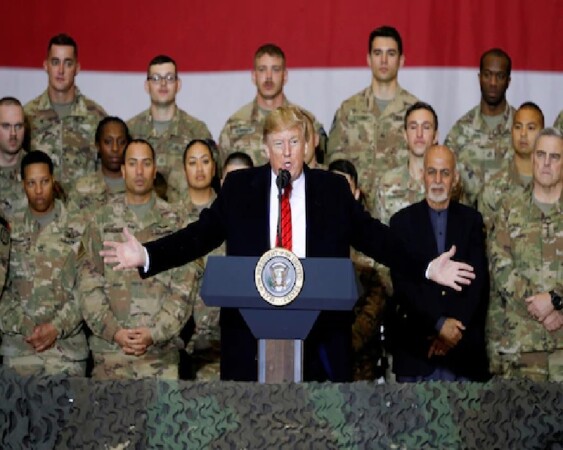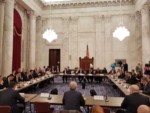A Russian military spy unit offered bounties to Taliban-linked militants to attack coalition forces in Afghanistan, including U.S. and British troops, in a striking escalation of the Kremlin’s hostility toward the United States, American intelligence has found.
The Russian operation, first reported by the New York Times, has generated an intense debate within the Trump administration about how best to respond to a troubling new tactic by a nation that most U.S. officials regard as a potential foe but that President Trump has frequently embraced as a friend, said the officials, who spoke on the condition of anonymity to discuss a sensitive intelligence matter.
The officials said administration leaders learned of reported bounties in recent months from U.S. intelligence agencies, prompting internal discussions, including a large interagency meeting in late March. According to one person familiar with the matter, the responses discussed at that meeting included sending a diplomatic communication to relay disapproval and authorizing new sanctions.
Spokesmen for the National Security Council, the Pentagon and the CIA declined to comment.
In a statement late Saturday Director of National Intelligence John Ratcliffe said he had “confirmed that neither the President nor the Vice President were ever briefed on any intelligence” related to a Russian bounty, and that all news reports “about an alleged briefing are inaccurate.”
Ratcliffe’s statement, and an earlier statement by White House press secretary Kayleigh McEnany, did not address the accuracy of the reported intelligence information.
Former vice president Joe Biden, the presumptive Democratic presidential nominee, on Saturday said he was “outraged” by the reported intelligence and by what appeared to be inaction from the administration. Trump’s “entire presidency has been a gift to [Russian President Vladimir] Putin,” he said. “But this is beyond the pale.”
The Russian Ministry of Foreign Affairs said in a statement that the story “illustrates the low intellectual abilities of propagandists from American intelligence, who instead of inventing something more reliable have to come up with such nonsense. . . . However, what else can be expected from intelligence, which miserably failed the twenty-year war in Afghanistan.”
The Taliban denied involvement.
“We categorically reject the notion of ever planning or carrying out targeted attacks against U.S. or foreign forces at the behest of foreign intelligence or for the sake of collecting bounty,” said Taliban spokesman Zabiullah Mujahid in a statement, “and we also reject receiving material support from foreign intelligence because such undertakings are harmful for the sovereign decision-making of any country and movement.”
The reports of Russian involvement in operations targeting Americans sparked anger on Capitol Hill and questions about why the administration has not responded to them.
Sen. Tammy Duckworth (D-Ill.), a combat veteran who sits on the Senate Armed Services Committee, criticized Trump for supporting Russia’s return to the G-7 group of nations at a time when Moscow was, according to U.S. intelligence, seeking to harm American troops.
“Donald ‘America First’ Trump is literally placing Russian interests ahead of American lives, and Republicans do nothing,” she tweeted. “Putting party before country doesn’t just empower Trump to continue serving his own interests, it can cost American lives too.”
Rep. Michael McCaul (R-Tex.), the top Republican on the House Foreign Affairs Committee, said in a statement posted to Twitter that he had requested additional information from the administration, and that such an operation would deepen his concerns about Moscow’s actions beyond Russian borders. “If accurate, the administration must take swift and serious action to hold the Putin regime accountable,” he said.
It was not immediately clear whether any militants had succeeded in killing Americans or allied forces after being approached by Russia. News of the murky initiative comes as U.S. diplomats attempt to kindle political talks that could put an end to the country’s longest war, now in its 19th year.
Earlier this year, the administration struck an initial peace deal with the Taliban. The agreement, which outlined the full withdrawal of the U.S. military within 14 months, was supposed to lead to a prompt start to talks between militant representatives and the Afghan government.
But the Afghan parties have failed to complete interim steps, and with the coronavirus crisis taking hold in Afghanistan, those talks have yet to materialize. Hanging over the process is Trump’s oft-stated desire to remove U.S. forces from the country, where local forces have been unable to secure an edge over the Taliban despite two decades of foreign funding and advising.
The attempt to stoke violence against Americans, if confirmed, would also represent a significant departure from Moscow’s earlier position toward Islamist militants in Afghanistan. Previously, U.S. officials had cited what they characterized as sporadic, low-level Russian support for the Taliban, including the supply of small arms via Afghanistan’s northern neighbors.
After the Soviet Union’s own punishing insurgent war in Afghanistan in the 1980s, Moscow remained largely in the background in the years after U.S. and NATO forces entered the country in the wake of the Sept. 11, 2001, attacks. But as the U.S. intent to withdraw fueled uncertainty, Russia has attempted to wield greater influence.
While Moscow’s motives for allegedly offering bounties were not immediately clear, officials said they might include retaliation for the U.S. military’s 2018 killing of Russian mercenary troops working for Yevgeniy Prigozhin, an oligarch with links to Putin, in Syria, or simply, as one official put it, an attempt to “muddy the negotiations on Afghanistan by throwing a stick in that.”
During the Soviet war in Afghanistan, which ended in 1989, the U.S. government provided weaponry and funds to Afghan mujahideen rebels fighting against Soviet forces.
The unit that officials identified as responsible for offering the bounties has also been linked to the poisoning and attempted murder of former Russian military spy Sergei Skripal in Britain in 2018.
While that attack — along with Russia’s invasion of Ukraine and its role in the war in Syria — has generated strong criticism in Europe and from many of Trump’s most senior advisers, the president himself has frequently appeared to have a chummy relationship with Putin, downplaying the Kremlin’s interference in the 2016 U.S. election and other Russian transgressions.
The United States has imposed sanctions on Russia over various issues, including its annexation of Crimea, cyberattacks, and election interference. Military officials spoke out in unusually harsh terms earlier this month over what they said was Russia’s decision to move fourth-generation fighter jets into Libya, adding to a spiraling proxy conflict there.
News of the cloaked operation comes as speculation mounts about the future of U.S. forces in Afghanistan. While the Pentagon has completed its initial drawdown to about 8,600 service members — a first step toward the full withdrawal that, under the February peace deal, is supposed to occur by the spring of 2021 —, officials describe the exit plans as “conditions-based” and say those terms have not yet been met.
Even as Taliban forces halt attacks against U.S. forces as part of that deal, the militants have continued to assault Afghan troops, making for what one senior Afghan official described recently as the deadliest situation in 19 years.
CNN reported on Saturday that the administration was “close to finalizing” a decision to remove an additional 4,000 troops by the fall. Officials say that no final decisions have been made but that, conditions allowing, several thousand more are likely to be withdrawn by the fall.
Karen DeYoung, Dan Lamothe and Sean Sullivan contributed to this report.
The original Article can be found @TheWashingtonPost







Leave a Reply